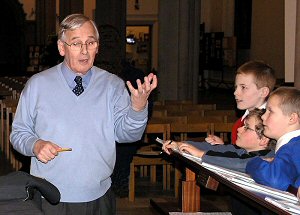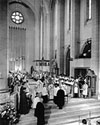
 Internationally known as one the UK's leading choirtrainers, Barry Rose
began his musical career in the most unusual circumstances - playing
hymns on the harmonium in a local mission-church on Sundays, whilst
working in a London insurance office during the week.
Internationally known as one the UK's leading choirtrainers, Barry Rose
began his musical career in the most unusual circumstances - playing
hymns on the harmonium in a local mission-church on Sundays, whilst
working in a London insurance office during the week.
In
1958, at the age of 24, he decided to give up the world of commerce,
and on the advice of the late Felix Aprahamian (music critic of The SundayTimes), he auditioned for a place at The Royal Academy of Music, to study organ with C.H.Trevor.
By then, Barry was organist and choirmaster of St. Andrew's Church, Kingsbury,
a fine suburban church in North West London, where he had enlarged and
improved the already flourishing boys choir, as well as bringing in
musical friends to sing in the back-rows.
Apart from the experience gained in playing regularly for Sunday Worship, he says that that most influential period of his young musical life was the eighteen months he had previously spent singing Bass in Martindale Sidwell's choir at Hampstead Parish Church, where, as he puts it "you learn to think like a singer, rather than an organist". In those days the Hampstead choir was regarded as the finest church choir in the land, and testimony to this is the list of many broadcasts, concerts, recordings and tours in which they took part.
He also cites the enormous influence of Boris Ord's choir at King's College, Cambridge, Stanley Vann's choir at Peterborough Cathedral, and perhaps most of all, the friendship with and encouragement from George Guest, whose choir at St. John's College, Cambridge, was to be a model on which Barry was to base his musical approach and sound.
Against all the odds, and without a single formal musical qualification to his name, in May 1960, Barry was appointed as the first Organist and Master of the Choristers of the new Guildford Cathedral. This controversial appointment would not have been made without the foresight and wisdom of the then Provost of Guildford, The Very Reverend Walter Boulton, who was to be shamefully passed over, when the appointment of the first Dean of the new Cathedral was made.
Once in Guildford, Barry set about creating a musical foundation which would bring daily sung Services to the new Cathedral. Over the first year or so there was the inevitable hesitant start by the boys, but they were encouraged and supported by a most expert and musical group of Lay Clerks, many of whom were accomplished soloists in their own right. The Guildford choir soon established itself in the forefront of choral music of the time, achieving widespread recognition through its several best-selling recordings for EMI, both on the HMV label, and on the newly founded Music for Pleasure label - listen to Silent Night, as recorded for the LP Christmas Carols from Guildford Cathedral, 1966. These recordings have sold in the hundreds of thousands, some still remaining in the current cataolgues, and a measure of their success is the 1 Platinum, 1 Gold, and 2 Silver Discs so far awarded to the choir.
NOW WATCH the presentation of Platinum & Silver discs - June, 1991
More than 50 years on after his appointment, Barry Rose can look back on three successful periods with three Cathedral choirs - Guildford (1960-74), St. Paul's (1974-84) and St. Albans (1988-97), as well as twenty years at the BBC, as George Thalben Ball's successor as Music Adviser to the Head of Religious Broadcasting.
May 2011 saw the 50th Anniversary of the Consecration of Guildford Cathedral, and by way of a continuing celebration, and as a tribute to every boy and man who has ever sung with the choir, here, on this website, you can now listen to some previously unheard and unpublished recordings. All of these excerpts are live performances, exactly as they happened.
Read more about Guildford Cathedral
| Gallery >> (Click any thumbnail for full-size image) | |||
Guildford Cathedral Consecration, May 17th, 1961 |
Aerial view of Guildford Cathedral |
The Nave, Guildford Cathedral (Copyright photograph by Nicolas Ware) |
Guildford
Cathedral organists and sub-organists at the 2009 Former Choristers'
Reunion; from left to right: Philip Moore, Peter Moorse, Gavin
Williams, Anthony Froggatt and Barry Rose. |



